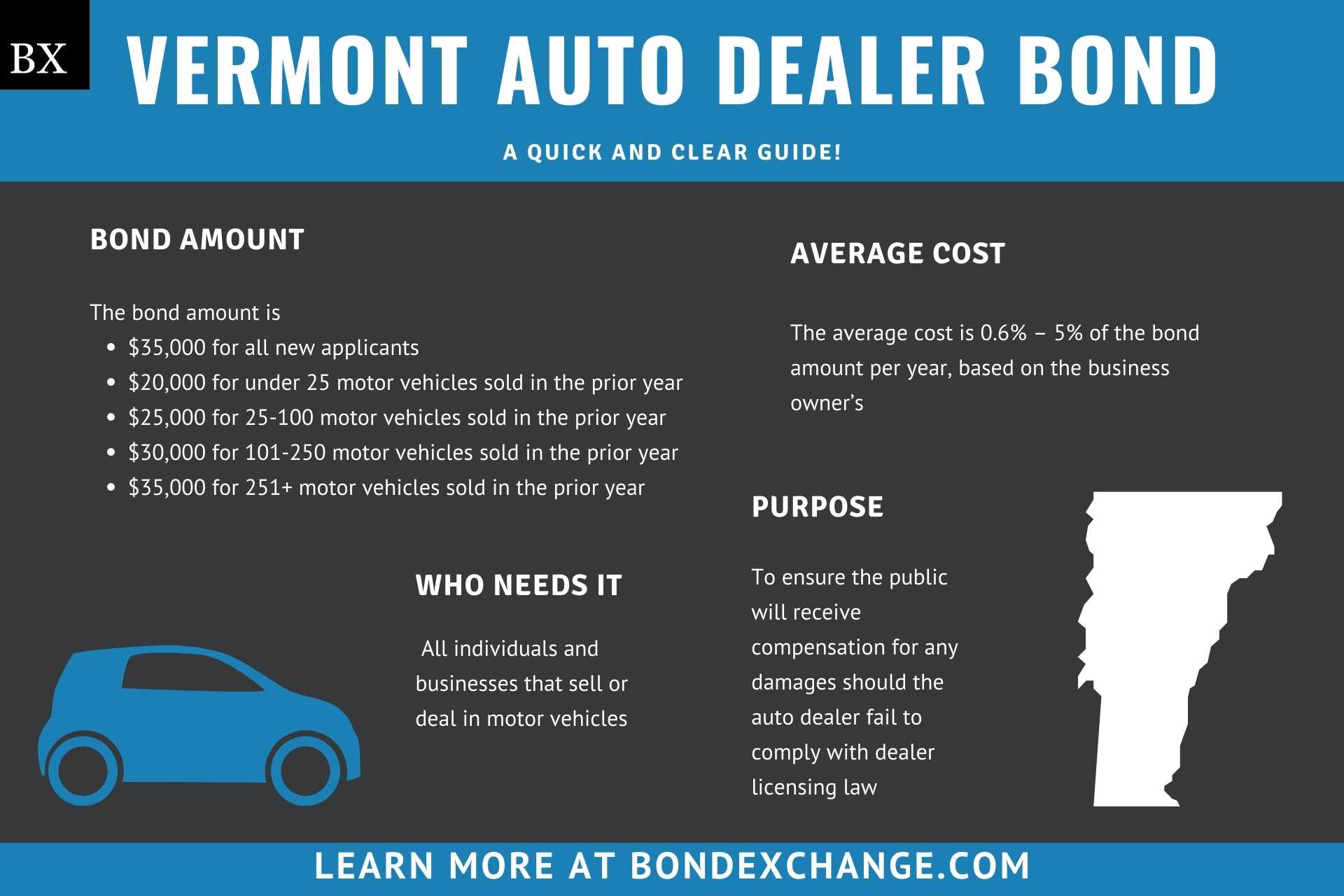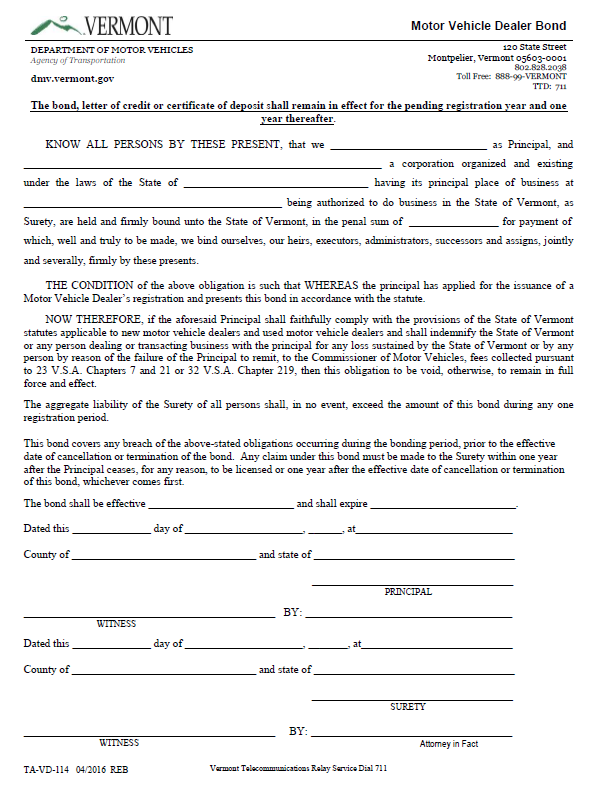Vermont Auto Dealer Bond: A Comprehensive Guide
October 15th, 2020

This guide provides information for insurance agents to help new and pre-owned car dealership owners on Vermont Auto Dealer bonds
At a Glance:
- Average Cost: Between 0.6% – 5% of the bond amount per year, based on the business owner’s credit
- Bond Amount:
- $35,000 for all new applicants
- $20,000 for under 25 motor vehicles sold in the prior year
- $25,000 for 25-100 motor vehicles sold in the prior year
- $30,000 for 101-250 motor vehicles sold in the prior year
- $35,000 for 251+ motor vehicles sold in the prior year
- Who Needs It: All individuals and businesses that sell or deal in motor vehicles
- Purpose: To ensure the public will receive compensation for any damages should the auto dealer fail to comply with dealer licensing law
- Who Regulates Dealers in Vermont: The Vermont Agency of Transportation, Department of Motor Vehicles (DMV)
Background
Vermont statute 23 V.S.A. § 451 mandates auto dealers operating in the state to obtain a motor vehicle dealer certificate with the DMV. The Vermont legislature enacted the certificate and regulations to ensure that dealers engage in ethical business practices and remit required taxes and fees. In order to provide financial security for the enforcement of the certificate law, dealers must purchase and maintain a surety bond to be eligible for licensure.
What is the Purpose of the Vermont Auto Dealer Bond?
Vermont requires dealers to purchase the Motor Vehicle Dealer Bond as part of the application process for the Motor Vehicle Dealer Certificate. The bond ensures that the public will receive compensation for financial harm if the auto dealer fails to comply with the licensing regulations and that the dealer will pay all required taxes and fees to the State of Vermont. In short, the bond is a type of insurance that protects the public if the dealer breaks licensing laws

How Can an Insurance Agent Obtain a Vermont Auto Dealer Bond?
BondExchange makes obtaining the Vermont Auto Dealer Bond easy. Simply login to your account and use our keyword search to find the “auto dealer” bond in our database. Don’t have a login? Enroll now and let us help you satisfy your customers’ needs. Our friendly underwriting staff is available by phone (800) 438-1162, email or chat from 7:30 AM to 7:00 PM EST to assist you.
At BondExchange, our 40 years of experience, leading technology, and access to markets ensures that we have the knowledge and resources to provide your clients with fast and friendly service whether obtaining quotes or issuing bonds.
How Much Does the Vermont Auto Dealer Bond Cost?
The Vermont Motor Vehicle Dealer surety bond can cost anywhere between 0.6% to 5% of the bond amount per year. Insurance companies determine the rate based on a number of factors including your customer’s credit score and experience. We also offer easy interest-free financing for premiums over $500. The chart below offers a quick reference for the approximate bond cost on the $35,000 bond requirement.
$35,000 Vermont Auto Dealer Bond Cost
| Credit Score* | Bond Cost (1 year) |
|---|---|
| 699+ | $210 |
| 660 – 698 | $238 |
| 650 – 659 | $245 |
| 629 – 649 | $350 |
| 619 – 628 | $455 |
| 600 – 618 | $700 |
| 550 – 599 | $1,400 |
| 500 – 549 | $1,750 |
*The credit score ranges do not include other factors that may result in a change to the annual premium offered to your customers, including but not limited to, years of experience and underlying credit factors contained within the business owner’s credit report.
How Does Vermont Define “Motor Vehicle Dealer”?
To paraphrase Vermont Statute 23-001-4, a motor vehicle dealer is any person or business entity who buys, sells, exchanges, leases, repairs or recycles motor vehicles either directly or indirectly. A motor vehicle dealer also satisfies the following requirements:
- No violations of any laws or regulations pertaining to the sale of motor vehicles or consumer protection
- Established place of business that is open at least 146 days a year
How Do Dealers Apply for a Motor Vehicle Dealer Certificate in Vermont?
The process for applying for a motor vehicle dealer certificate in Vermont is pretty complex. Below are the general guidelines, but dealers should refer to the Dealer Checklist for details on the process.
Certificate Period – The dealer certificate is valid for one year from the first day of the month of issuance and must be renewed before the expiration date. The commissioner of the DMV has the authority to renew dealer certificates on a two year basis or stagger expiration dates.
Step 1 – Determine the Certificate Type
Vermont requires dealers to obtain specific certificates corresponding to the nature in which the dealer’s business operates. Keep in mind that dealers will need to acquire a certificate for each type of business they wish to operate. Below are the different types of the Vermont dealer certificate:
-
- New – Sells new or used motor vehicles
- Used – Sells used motor vehicles only
- Auction – Sells motor vehicles at a public auction
- Farm Equipment – Sells agricultural machinery, equipment and supplies
- All-Terrain Vehicle – Sells ATVs
- Finance – Finances motor vehicle sales
- Highway Building/Equipment – Sells machinery and equipment used in the creation of roads and highways
- Motorboat – Sells motorboats
- Motorcycle – Sells motorcycles
- Snowmobile – Sells snowmobiles
- Trailer – Sells trailers
Step 2 – Establish a Location
Dealers are required to establish a permanent place of business with a building that is at least 1,200 square feet.
Step 3 – Obtain Zoning Approval
Dealers must obtain approval from their local zoning official certifying that their business location is in compliance with all applicable zoning regulations. Dealers must submit a Zoning Compliance Certification with their application.
Step 4 – Complete a Background Check
Dealers must fill out a Dealer License Background & Authority to Release form and submit it with their application.
Step 5 – Acquire Insurance
Dealers are required to purchase and maintain liability insurance for all vehicles with dealer plates (limits not specified).
Step 6 – Purchase a Surety Bond
First time dealer applicants must purchase and maintain a $35,000 auto dealer surety bond. The bond limit may decrease depending on the dealer’s yearly sales volume.
Step 7 – Complete the Application
All new dealer regulatory certificate applications should be mailed to:
Department of Motor Vehicles
120 State Street
Montpelier, Vermont 05603-0001
Dealers can access the dealer certificate application here.
-
- 7.a Franchise Agreement – Dealers selling new vehicles must submit a franchise agreement authorizing them to sell each make and model of new motor vehicle
- 7.b Deed/Lease – Dealers who lease their business location must submit a copy of their lease agreement that is valid for a minimum period of 1 year. Dealers who own their business location must submit a copy of their deed
Step 8 – Obtain Dealer Plates
Dealers are allotted three initial dealer plates free of charge. Additional dealer plates are dependent upon the dealer’s sales output/estimated sales output as referenced in the below table:
| Yearly Sales Volume (Real or Estimated) | Additional Dealer Plates |
|---|---|
| 20 – 49 | 1 |
| 50 – 99 | 5 |
| 100 – 249 | 12 |
| 250 – 499 | 17 |
| 500 – 749 | 27 |
| 750 – 999 | 37 |
Step 9 – Pay Fees
The following fees are associated with obtaining the Vermont Dealer Certificate:
-
- $55 fee for additional dealer plates (past the initial three)
- $62 fee for ATV dealers ($6 for additional certificates)
- $503 fee for new, used and finance dealers
- $78 fee for farm equipment dealers
- $123 fee for highway building/equipment dealers
- $42 fee for motor boat dealers ($12 for initial dealer plates)
- $62 fee for motorcycle dealers
- $55 fee for snowmobile dealers ($6 for additional certificates)
- $123 for trailer dealers
- $123 fee for transporters
How Do Vermont Auto Dealers Renew Their Certificate?
Dealers can renew their certificate by mailing the renewal application and all associated fees to the following address:
Department of Motor Vehicles
120 State Street
Montpelier, Vermont 05603-0001
The dealer certificate is valid for one year from the first day of the month of issuance and must be renewed before the expiration date. The commissioner of the DMV has the authority to renew dealer certificates on a two year basis or stagger expiration dates.
What Are the Insurance Requirements for the Vermont Auto Dealer Certificate?
The State of Vermont requires dealers to maintain liability insurance on all vehicles with dealer plates. Dealers must also file a motor vehicle dealer surety bond.
How Do Vermont Auto Dealers File Their Bond?
Dealers should mail the completed bond form, including the power of attorney, to the following address:
Department of Motor Vehicles
120 State Street
Montpelier, Vermont 05603-0001
The Vermont Dealer Bond requires signatures from both the surety company that issues the bond and the auto dealer. The bond form will require the following items:
- Legal name of entity/individual(s) buying the bond
- Date the bond is sealed
- State the Surety operates in
- Bond amount
- Date bond goes into effect
- Signatures of witnesses to both the surety company and principal
How Can Vermont Auto Dealers Avoid Bond Claims?
To avoid claims on the Motor Vehicle Dealer Bond, dealers must follow all dealer regulations in the state, including some of the most important issues below that tend to cause claims:
- Do not engage, or allow representatives of the business to engage, in any acts of fraud
- Pay sellers of vehicles promptly and in full
- Pay taxes on time and in full. Dealers should consider setting aside tax obligations as they accrue.
- Do not engage in any illegal selling practices
What Other Insurance Products Can Agents Offer Dealers in Vermont?
Vermont requires dealers to obtain comprehensive liability insurance on all vehicles with dealer plates. Most reputable dealers that provide towing or service station services should also obtain garage keepers liability. Bonds are our only business at BondExchange, so we do not issue any form of liability insurance, but our agents often utilize brokers for this specific line of business. A list of brokers in this space can be found here.
How Can Insurance Agents Prospect for Vermont Auto Dealer Customers?
Vermont unfortunately does not display motor vehicle dealer information to the public. We suggest contacting a list service company or the Vermont Secretary of State for a list of active motor vehicle dealers. Contact BondExchange for additional marketing resources. Agents can also leverage our print-mail relationships for discounted mailing services.
What Other States Require Auto Dealer Bonds?
All 50 states and the District of Columbia require auto dealers to obtain an Auto Dealer Bond as a prerequisite for licensure. Insurance agents should utilize our Main MVD Page for a detailed analysis of the Auto Dealer Bond requirements nationwide.

